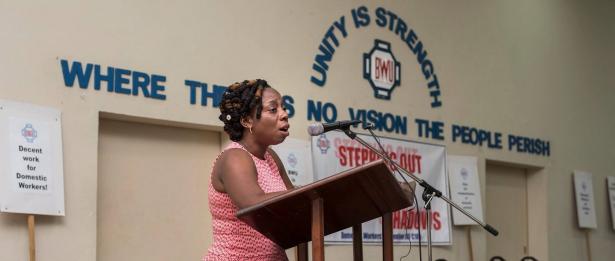The Commonwealth Trade Union Group (CTUG) represents 30 million workers from the Commonwealth of Nations, an intergovernmental organisation of 53 member states that are mostly former territories of the British Empire. This week, a delegation of 10 to 15 trade unionists, hosted by the UK’s Trades Union Congress (TUC), will be meeting in London during the biennial Commonwealth Heads of Government meeting which takes place from 16 to 19 April. They will discuss a number of issues such as the full ratification of International Labour Organization (ILO) Fundamental Rights Conventions by all Commonwealth countries, the creation of quality jobs for young people and a Just Transition to a low-carbon economy.
For many years the Commonwealth has been considered by some as a relic of the British Empire, but as the United Kingdom prepares to exit the European Union, questions about the role of the Commonwealth have taken on new significance. The recent scandal over the thousands of British citizens of Caribbean heritage being threatened with deportation – described by one MP as a “national day of shame” – further demonstrates the tensions between the UK government’s claims that Brexit represents a new chapter for ‘Global Britain’ and the hostile, anti-immigrant, ‘splendid isolation’ mindset epitomised by the Conservative government. Against this political backdrop and ahead of this week’s CTUG meeting, Equal Times spoke to Toni Moore, general secretary of the Barbados Workers’ Union, to discuss what the Commonwealth means to workers today.
What is the Commonwealth Trade Union Group meeting and why is it important?
It is an opportunity to emphasise the issues affecting workers at the level of the Commonwealth. We would have loved to have been a part of the Peoples’ Forum during the week [which brings together civil society from around the world to debate key issues] but we received word that it will be a very condensed delegation. But we see a tremendous opportunity for our representatives there to liaise with our ambassadors and get support for some of the positions that we’re pushing. We are calling for a fairer, more sustainable future that brings prosperity to everyone. That is what we will be lobbying for. And of course, democracy, equality and good governance. Not all Commonwealth member states have ratified the key ILO conventions. They not only need to be adopted, but governments need to make sure that the conventions carry weight. We want to see a recommitment to tripartism, because it is one thing when governments meet and make promises, but the application on the ground is what is worrying. In my own country, Barbados, for example, we have the tripartite model, but over the last decade, the administration hasn’t treated it the way that previous governments had. In 2018, part of my focus as the general secretary of the Barbados Workers’ Union is to urge a recommitment toward tripartite consultation. We also want to strengthen rights for vulnerable workers, such as migrants and domestic workers.
What purpose does the Commonwealth serves in this day and age, particularly for workers from the Global South?
Workers everywhere are facing the same issues: the need for job creation, youth empowerment, fairness in the protection of workers’ rights, security, opportunities for young people in the labour market and decent work. On behalf of the 30 million workers that we represent, we want to draw from our combined strength and use it as a force, to say that we are present and that we have a say in the future of the Commonwealth. Although our national contexts are varied, we are singing from the same hymn sheet.
How can trade unions can best contribute to the attainment of the Sustainable Development Goals (SDGs)?
We need a place at the table, which again, goes back to respecting the values of tripartite consultation. We don’t want to be a silent observer; trade unions must participate in the implementation of any action plan on the ground. The International Trade Union Confederation (ITUC) has been successful at getting decent work on the agenda of the SDGS. Whether you are looking at poverty alleviation, climate change or addressing the migrant issue, for example, true, lasting solutions can only come from engagement. Trade unions recognise what needs to be done and are crucial when it comes to mobilising the people, to getting workers to cooperate. We must make sure that there are no gaps between the objective, the message and the desired outcome. For example, a Just Transition and zero emissions will have an impact on jobs. You don’t want to end up with the displacement of people. You want to reengineer the economy so that people aren’t left behind. This will require broad action across different sectors.
What does Brexit mean for the Commonwealth?
Everything is up in the air at the moment. Many Commonwealth countries are currently dependent on Britain to facilitate trade across Europe, so the whole Brexit move leaves us very vulnerable. But I don’t even think that Britain knows what Brexit means for them right now. Or for the Europeans. In the short term there will be some haemorrhaging, mainly from trade. In certain areas, such as the Just Transition, our leaders have an opportunity to make an impact before Brexit becomes a reality. But in trade, we will have to negotiate new tariffs and trade deals. We would want to ensure that there is no cliff edge, that lower-middle income Commonwealth countries will still have market access. The European Union has engaged in a number of funding projects in different countries that may not end all of a sudden when the UK leaves the EU, but trade is a massive issue. And there are many countries that will be left vulnerable by Brexit because they are so dependent on trade with the EU.


Spread the word